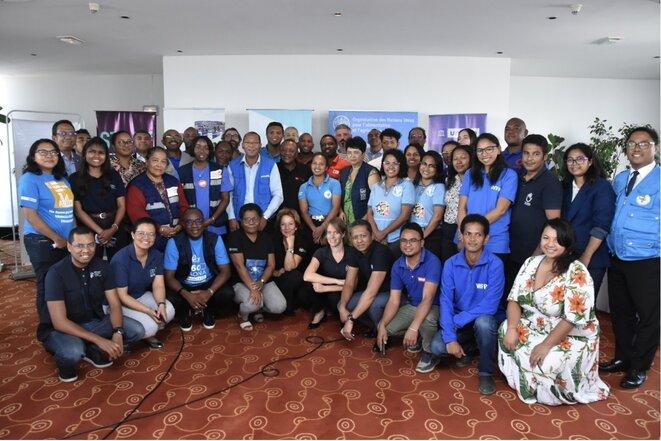Enthusiasm for disaster risk reduction evident at Madagascar retreat

On 15-17 November 2022, the United Nations Office for Disaster Risk Reducion (UNDRR), in partnership with the UN Resident Coordinator Office and the national strategic entity (Committee for Emergency Prevention and Management – CPGU) and operational entity (National Office for Risk and Disaster Management – BNGRC) for disaster management hosted the first Disaster Risk Reduction Retreat in Madagascar. The retreat was organized with the support of the UN Food and Agriculture Organization (FAO), the UN Educational, Scientific and Cultural Organization (UNESCO), the Private Sector Humanitarian Platform of Madagascar (PHSP) and the Start Network. It was made possible through financial support of the European Union, the United States Agency for International Development (USAID) Bureau for Humanitarian Assistance and the Connecting Business Initiative (CBI).
Madagascar is a country facing multiple hazards and frequently experiencing disasters such as cyclones and drought, where more than 3 million people are estimated as vulnerable across the country. Disaster Risk Reduction (DRR) is a priority for the country, where it is understood that greater alignment of activities between the Government, international actors, civil society, academic and private sectors will bring significant co-benefits. While a lot of good DRR work has already been done in the country, more is needed to bring pilot projects to scale and substantially reduce the risks communities are facing.
During the retreat, participants focused on several themes: trends in DRR; lessons from around the world in implementing disaster risk reduction; the scaling up of DRR in humanitarian action and emergency response; joint planning for DRR; integrating DRR into development initiatives such as the UN-led zones de convergence initiative and; implementing the action plan of the national strategy for disaster risk management. A separate segment focused on the role of the private sector in DRR and saw almost 40 representatives of companies engage in discussions on scaling up risk reduction in their business operations.
The first day introduced the concepts of DRR with participants learning from each other and jointly identifying key DRR actions across development sectors. The second day was all about humanitarian response, anticipatory action and resilience-building as part of the Humanitarian-Development-Peace nexus, with participants from different fields explaining the work already done to address underlying vulnerability and identifying opportunities to scale up DRR in humanitarian action. The Checklist on Scaling Up DRR in Humanitarian Action was reviewed to identify ways for improving humanitarian planning and programming.
The last day brought in new participants from the private sector to learn and share about DRR. The Private Sector Humanitarian Platform Madagascar and the UN Connecting Business Initiative highlighted their work on disaster preparedness and the ARISE network was emphasized as an opportunity for private sector companies to get engaged in DRR. The final segment focused on practical implementation, in line with the national disaster management strategy. This session was part of the Resilience Building and Disaster Response Management in the Indian Ocean (RDRM-IO) programme UNDRR, co-funded by the European Union (EU) in partnership with the Indian Ocean Commission (IOC).
Throughout the retreat, the energy and engagement by participants remained high. Engaging examples of DRR were shared and opportunities for better collaboration were identified. All in all, the event was an important step in increasing awareness of DRR and in bringing partners together for joint action. Concretely, retreat recommendations will be considered in the humanitarian planning for 2023 as well as in the UN’s zones de convergence initiative. This initiative brings together all UN entities active in Madagascar to jointly plan and deliver priority humanitarian, development and peace activities in eight communities of the country.
“DRR is a way to bring together humanitarian and development actors to jointly look at underlying vulnerabilities and find practical ways to address them. As risks are growing and humanitarian needs are on the rise, we need more collaboration on risk prevention,” said Amjad Abbashar, Chief, UNDRR Africa. “This DRR Retreat identified entry points and actions to mainstream DRR in key sectors and means to implement the Madagascar DRR National Strategy Action Plan in 2023 and beyond.”
To illustrate the importance of gathering different sectors ahead of disasters, the General Project Coordinator of the BNGRC, Lieutenant-Colonel Faly, visualized the importance of DRR: “It is not when we are under water, that we start to build a floating house”. With this pivotal image in mind, participants unanimously committed to taking forward DRR within their respective organizations, and to strengthen collaboration ahead of disasters. The DRR Retreat was an inspirational and engaging experience for all involved and will contribute to the operationalization of DRR actions across sectors and stakeholders.